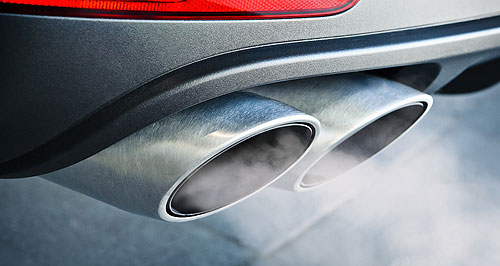News - BMWAustralia needs emissions regs, says BMWGoing green: Last year BMW equaled Audi as the least-emitting car manufacturer in Australia, helped along by fuel-efficient models such as the three-cylinder-powered 2 Series Active Tourer. BMW welcomes government proposals for emissions laws in Australia13 Apr 2016 A local BMW executive has cautioned that Australia must be treated differently to Europe if the implementation of carbon dioxide (CO2) emissions regulations in the transport sector is to occur. Speaking ahead of a federal government-initiated stakeholder engagement session about future C02 reduction legislation held last week, BMW Australia corporate communications general manager Lenore Fletcher told GoAuto that the Australian market needed to be considered alongside the United States, rather than Europe when it comes to emissions. “Before we go forward we need to recognise what reductions in emissions we’ve had in past years,” she said. “Australia has been lagging behind (in emissions regulations) and I think that’s recognised by everyone. “What we’re trying to do here is be able to talk about what is a good way going forward, what is achievable and what we can put in place (because) Australia is not like Europe. We are more like the US market having more SUVs than Europe where there is a larger proportion of very small cars.” In the first quarter of 2016, the micro, light and small passenger car segments amounted to 82,940 sales in Australia, each in decline compared with last year. Over the same period this year, SUV segments medium, large and upper large totalled 80,181 units, each showing growth from 2015. Based on current trends, a crossover point appears inevitable between traditionally more economical smaller classes and thirstier larger models. European legislation mandates that new car manufacturers do not exceed a range-wide emissions average of 95 grams of C02 per kilometre by 2020, down from the current 130g/km. Australia’s national emissions average stood at 184g/km last year, with no mandatory reductions currently in place. Ms Fletcher said that the current situation “is not a great picture” despite Australia being a beneficiary from emissions reductions made by European-based manufacturers such as BMW, which need to comply with overseas regulations. “A lot of work (has been) done with low-hanging fruit, a lot of work has come through from our mother countries,” she said. “The low-hanging fruit has been picked, so we need to look at the more difficult stuff. We have had really good reductions in the past few years, but is that (rate) sustainable.” The national average for new vehicle CO2 emissions improved by only 4g/km last year, an identical rate of improvement to the year prior. If the rate continues, Australia’s emissions will stand at 168g/km by 2020, less than half the reduction of 35g/km mandated in Europe by the same date. “We obviously support the implementation of a CO2 standard in Australia but it has got to be relevant to market conditions and it has to be achievable.” Ms Fletcher said that the push to introduce emissions regulations has support from other car manufacturers. Along with Audi, BMW was the least-emitting top 15 brand in Australia last year with a fleet average of 149g/km. “Pretty much every major brand is bringing out some sort of alternative-fuelled vehicle. There is definitely a combined approach from the industry, manufacturers are very interested in alternative fuels.” Ms Fletcher said that although buyer incentives to buy low-emissions vehicles would be ideal, there are other ways the federal government can shift purchasing behaviour to boost the sales of low-emissions vehicles, many of which have battery technology that makes them more expensive to produce. “We’re not asking the government to subsidise necessarily, but there are many ways the government can underwrite this technology – free toll lanes, free parking, free charging and an extension for infrastructure for charging, state-based rebates for registration and federal-based tax breaks for import tariffs. “Even just a stated goal of low-emission vehicles by a stated date, and a discussion about that to promote awareness, there are many things that could be done that don’t have to be cost-negative for the government,” she added. BMW Australia has previously said that abolishing the luxury car tax (LCT) on expensive low-emissions vehicles would also help drive sales, wiping approximately $10,000 off the price of the recently launched $118,950 (plus on-road costs) X5 xDrive40e plug-in hybrid. Discussions between federal minister for major projects, territories and local government Paul Fletcher, federal environment minister Greg Hunt, and the transport sector will continue ahead of a draft report due to be handed down on the issue by June 30. A draft implementation plan for the reduction of road transport emissions in Australia will be released by March 31, 2017.  Read more |
Click to shareBMW articlesResearch BMW Motor industry news |

















Facebook Twitter Instagram